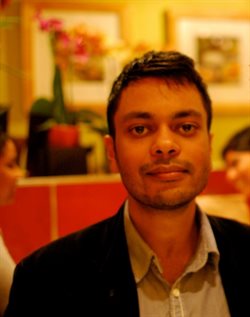King's medical alumni named most likely to make a significant contribution to the field of psychiatry
 Dr Vivek Datta is currently a Fellow in Psychiatry and the Law at the University of California, San Francisco. He graduated from the GKT School of Medical Education in 2010 and during his time here was the President of PsychSoc (King’s Psychiatry Society) in 2007-08 when it was the only psychiatry student interest group in the UK.
Dr Vivek Datta is currently a Fellow in Psychiatry and the Law at the University of California, San Francisco. He graduated from the GKT School of Medical Education in 2010 and during his time here was the President of PsychSoc (King’s Psychiatry Society) in 2007-08 when it was the only psychiatry student interest group in the UK.
At the time there were societies for other medical specialties, but none of the medical schools in the UK had a psychiatry society. King’s was the first in the UK and it ended up becoming the largest society in the medical school. The Royal College of Psychiatrists actually asked us to help them roll out this model across the UK.
He was invited to join the Royal College of Psychiatrists’ Undergraduate Teaching and Recruitment working groups, helping them to roll out the model.
They were concerned that only 1 in 6 psychiatric trainees were from UK medical schools, which meant the UK was relying heavily on international graduates and they thought that stimulating medical student interest in the field was essential to boosting recruitment.
This gave me a fantastic opportunity to be exposed to the leaders in the field on a national scale, an opportunity I would not have had, had I not been at King’s.
During his fourth year at GKT School of Medical Education, Vivek developed a Student Selected Component with Professor Dinesh Bhugra using film to explore how the portrayal of mental illness has changed over time. As a result of this work, he was invited to help develop the psychiatry curriculum for Deakin University School of Medicine in Australia.
I published a paper about the course and while I was on my elective in Papua New Guinea I received an email from Deakin University asking if I could help develop their core psychiatry curriculum and teach on it remotely.
This was another fantastic opportunity I almost certainly wouldn’t have had if I hadn’t been at King’s. It helped develop my interest in medical education which continues to be a major interest of mine to this day.
After graduating from King’s, Vivek undertook a Masters in Public Health at Harvard as a Frank Knox Memorial Fellow. He completed his psychiatry residency training at the University of Washington Medical Center, Seattle where he was Chief Resident for Education and Director of the Neuropsychiatry Consultation Service.
Amongst his many duties, he is currently a Staff Psychiatrist at San Quentin State Prison, home to the largest death row population in the western world.
In October, Vivek came back to King’s to talk with our current medical students about his work as well as the legal and ethical issues related to working with death row inmates.
California just voted to retain the death penalty. There are currently 745 people on death row, though since 1978 more people have died by suicide than been executed by the state.
I see some of the most seriously mentally ill people I have ever seen on death row. What’s remarkable is many of them weren’t mentally ill at the time of their offenses, but have become so while incarcerated.
There are a lot of ethical issues in forensic psychiatry. You have to be mentally competent to be executed, but if you treat someone’s mental illness, that might restore their competency to be executed. As doctors we have an obligation to do no harm, but in some cases, treating someone might lead to their execution – it’s a very delicate situation. Luckily, there has been a moratorium on executions in California, so it isn’t a situation I have had to face.
Speaking to the current medical students about my work was a great opportunity. They seemed interested, fascinated and horrified. They didn’t quite know how to make sense of it all.
It was strange coming back. I’ve done many talks to a lot of different audiences, but I hadn’t prepared as much as I did for this talk, he laughed, I really wanted to do a good job and try and share some enthusiasm for forensic psychiatry with the students.
While heading back to the US, Vivek was informed that he had been awarded the Laughlin Fellowship of the American College of Psychiatrists, which is awarded annually to 12 young psychiatrists from the US and Canada deemed most likely to make a significant future contribution to the field of psychiatry.
I am incredibly honoured to be a recipient of this fellowship as I begin my career. I have had the great fortune of having wonderful mentors and opportunities to grow both personally and professionally, beginning with my time as a medical student at King's.
We congratulate Dr Datta for all of his work and look forward to hearing more about his journey in making a significant contribution to the field of psychiatry.
The GKT School of Medical Education has addressed the need for holistic patient-centred doctors who are champions for mental health through our MBBS Curriculum 2020. The curriculum incorporates mental health through four years of teaching, which triples the amount of mental health previously offered, and fully embeds mental health into all clinical placements. At King’s our students will have an element of mental health underpinning their medical education which will ensure that our graduates are at the forefront of medicine.